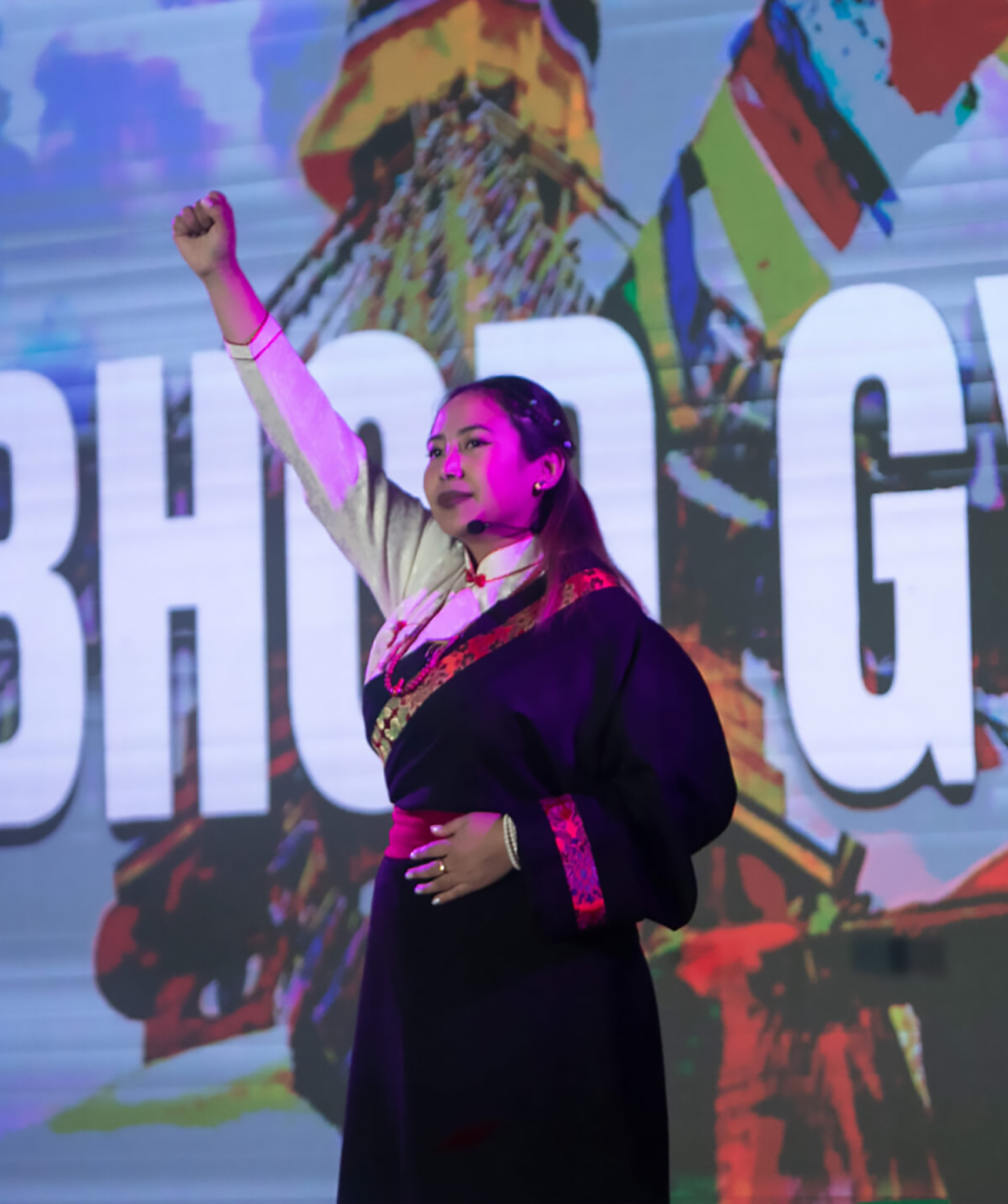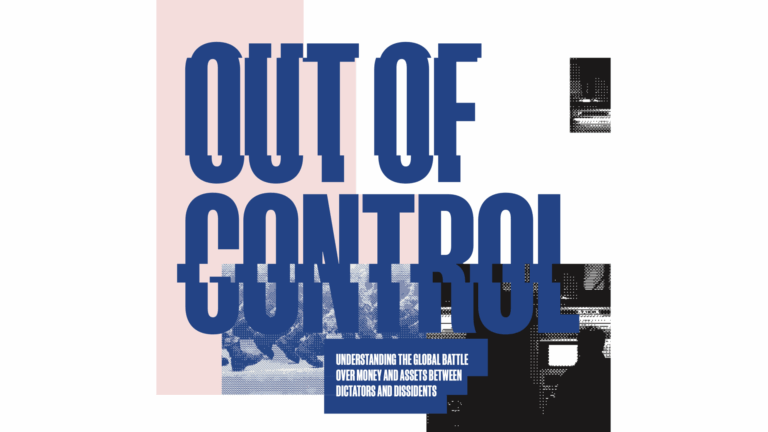With 2023 coming to a close, the Human Rights Foundation (HRF) would like to thank you for continuing to support our efforts to promote and protect human rights worldwide. In the face of new and ongoing challenges, HRF made significant strides — from winning legal challenges to leading award-winning campaigns to supporting individuals on the perilous frontlines.
We hope you enjoy learning about our major victories in 2023. If you want to help us make an even greater impact in 2024, we hope you’ll consider donating or getting involved in our work today.
Winning Legal Challenges

HRF’s Impact Litigation program litigates on behalf of prisoners of conscience before international courts and semi-judicial bodies like the UN Working Group on Arbitrary Detention (UNWGAD). In 2023, the Impact Litigation team upheld its 100% success rate on opinions issued by UNWGAD for our submissions.
In April, Russian opposition leader and long-time OFF community member Vladimir Kara-Murza was arrested for high treason and “spreading false information” about Russia’s war in Ukraine. HRF has since tirelessly advocated for his release, meeting with lawmakers, sending letters to US President Joe Biden, and submitting urgent appeals to the UN. Today, Kara-Murza remains in an isolation cell at a maximum security prison, his health deteriorating each day.
Liberating Prisoners of Conscience
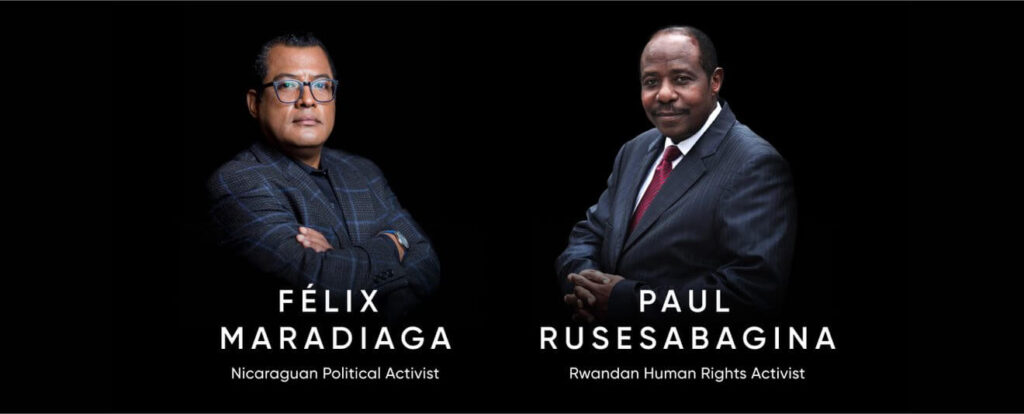
This spring, HRF celebrated the release of two longtime community members, Félix Maradiaga, a former Nicaraguan presidential candidate and Oslo Freedom Forum (OFF) speaker, and Paul Rusesabagina, a staunch critic of Rwanda’s dictator and the real-life “Hotel Rwanda” hero. Both were imprisoned and tortured for the simple reason that they stood for democracy in their home countries.
Last year, HRF invited Félix’s wife, Berta Valle, and Paul’s daughter, Carine Kanimba, to tell their stories on the OFF mainstage. Through their connections in our community, they found the resources and inspiration to keep going and eventually free their loved ones.
HRF Media Impact

Sharing activist stories through the media is critical to HRF’s strategy. Doing so gives voice to the voiceless and empowers journalists to hold the world’s leaders and dictators accountable.
This year, our advocacy efforts earned 71 billion global impressions and more than 15,400 mentions in news outlets, including POLITICO, Newsweek, The Atlantic, Forbes, El País, and Vogue. Our campaigns reached more than 23.8 million social media impressions and counting.
15 Years of the Oslo Freedom Forum
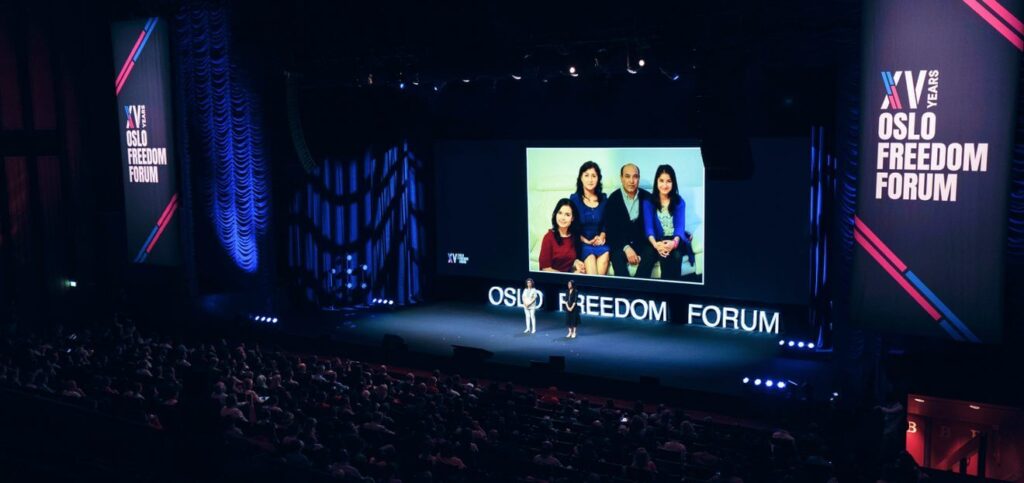
This year, HRF hosted the 15th Forum in Oslo, Norway. Our diverse community of dissidents, opposition leaders, and human rights allies reunited in the spirit of “Celebrating Solidarity,” the theme of this year’s event. The Forum honored the strength of the community HRF has built over the past decade and a half. It was the biggest year yet, including 75 speakers and over 1,300 attendees from 50 countries.
Join us in Oslo next year on June 3-5 to experience this inspiring event yourself. Learn more at oslofreedomforum.com.
Global Satellite Events
The success of OFF has inspired one-day Forums in New York and Taiwan over the past few years. In September, HRF hosted the fifth OFF in New York at the historic The Town Hall in midtown Manhattan, with a Speaker Gala afterward at Rockefeller Center’s Rainbow Room.
Soon after, HRF opened the fourth OFF in Taiwan. An audience of 300 journalists, civil society leaders, students, and ordinary citizens listened to the stories of renowned global activists from Hong Kong, Syria, Swaziland, Ukraine, Venezuela, and more.
HRF first visited Taiwan in 2010 to lay the groundwork for OFF. Back then, before presenting a speech at a humanitarian affairs conference, HRF CEO Thor Halvorssen was urged by the Foreign Ministry of then-President of Taiwan Ma Ying-jeou not to criticize the Chinese Communist Party (CCP). Halvorssen did the opposite, condemning the CCP’s atrocious human rights record, and President Ma left in the middle of his speech.
In contrast, HRF received a warm welcome this year from the Ministry of Foreign Affairs, the Legislative and Executive Yuan, the Parliamentary Human Rights Commission, and the Presidential Office. Halvorssen recounted the events from 2010, which were featured across Taiwanese television, radio, and print newspapers. The current administration made an official response, criticizing former President Ma and reaffirming its support for our work.
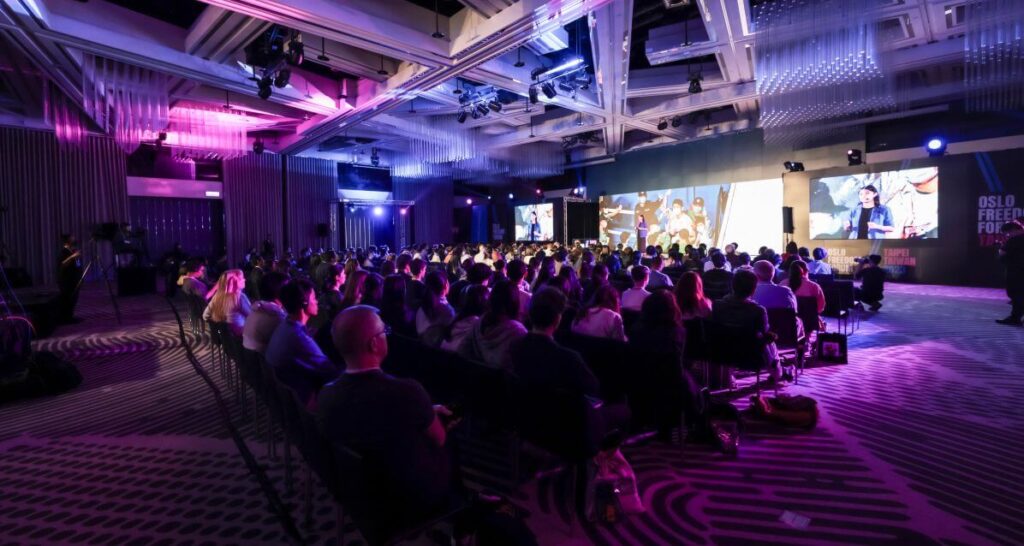
Expanding Efforts in Korea
This fall, we hosted the first working retreat for the North Korean human rights community. More than 30 civil society organizations met to share victories and challenges and collectively identify the top priorities for this year’s struggle.
While in Korea, South Korea’s minister of unification, Kim Yung-ho, hosted HRF for a meeting, during which we discussed ways to increase the flow of outside information into North Korea. He singled out our advocacy as “bold and creative” and expressed his “deepest appreciation” for our work.
We visited South Korea’s National Assembly to open an art exhibition, “Singing About North Korea: Heaven on Earth,” co-sponsored by Ji Seong-ho, a parliamentarian and former OFF speaker. Featuring the work of Song Byeok, a former North Korean government propagandist, the exhibit contrasted the idealized image depicted in his propaganda and the famine, torture, and abuse he faced.
We also caught up with longtime HRF local partners to discuss HRF’s award-winning Flash Drives for Freedom (FDFF) campaign, which disseminates external information into North Korea via flash drives and SD cards. This year, FDFF sent more than 3,000 media devices into the country and, since 2016, over 133,500 devices, reaching more than one million North Koreans.
Beyond Utopia

While in Korea, we visited with OFF speaker Pastor Seungeun Kim, the head of South Korea’s Caleb Mission, who has rescued over 1,000 North Korean defectors and assisted in their resettlement in South Korea. His efforts are depicted in HRF’s latest documentary, “Beyond Utopia,” which follows the harrowing journey of several North Korean defectors as they try to escape the country with the help of Pastor Kim.
The film has received international praise from Variety, Harper’s Bazaar, and The Hollywood Reporter. It won the Audience Award for US Documentary at the 2023 Sundance Film Festival and, as of today, is an early favorite to be nominated for a Best Documentary Oscar.
Wear Your Values

We took our Wear Your Values program around the world, shedding light on the hidden social costs of the fashion industry and promoting transparency in global supply chains. In Norway, HRF hosted a fashion show with the award-winning Swedish fashion designer Louise Xin, earning a feature in Vogue while calling attention to the global clothing industry’s complicity in the CCP’s attempt to erase the Uyghur people and culture.
At the SXSW festival in Austin, Texas, we partnered with the creative agency Le Truc to launch a Discounted Livescampaign. The interactive installation displayed two racks of T-shirts, one listed at $4.99 and the other at $44.99. Receipts show the reasons behind the discounts — numerous human rights violations — and the faces of the Uyghur prisoners.
During New York and London Fashion Weeks, HRF projected images of the installation on iconic landmarks across the cities, spotlighting the fashion industry’s complicity in Uyghur forced labor. A QR code led onlookers to download HRF’s award-winning Uyghur Forced Labor Checker, a Google Chrome extension that helps inform shoppers whether a brand might be linked to Uyghur forced labor. We saw a significant increase in downloads and a bot attack from the CCP, as covered in Bloomberg.
CBDC Tracker Launch
On Nov. 14, at the National Press Club in Washington, D.C., HRF launched its Central Bank Digital Currency (CBDC) Tracker, a new online tool that tracks the global development and implementation of CBDCs, or digital national currencies, with a focus on authoritarian regimes. We presented our research to a room full of congressional staff, policymakers, media, think tank leaders, and activists.
The Tracker is part of HRF’s Financial Freedom program, which offers activists education, hands-on training, and financial tools, helping them keep going even if the government wants them to stop.
Freedom Fellowship
The Freedom Fellowship is a year-long initiative offered to human rights advocates, social entrepreneurs, and nonprofit leaders from authoritarian regimes. In Norway, we commenced the 2023-24 class of Freedom Fellows, including activists from Cuba, Hong Kong, Nigeria, the Uyghur Region, and more.
During their program, the fellows receive world-class training on fundraising, movement-building, marketing, digital security, financial freedom, video production, and self-care. In September, the current class traveled to Costa Rica for an intensive, one-week capacity-building retreat, developing critical skills and forging meaningful connections with the community.
Humanitarian Aid in Ukraine
Just as it is for Kara-Murza, the horrific war that Russia’s dictator started when he invaded Ukraine remains a top concern at HRF.
This year, HRF’s Ukraine Solidarity Fund partnered with Razom, Renegade Relief Runners, and Ocean of Hope to distribute essential resources to Ukrainians on the ground. With their help, we have delivered millions of dollars worth of stable-shelf food, sterile medical equipment, essential medicines, generators, and other life-saving goods to unstable regions, including recently liberated villages and villages currently under invasion and bombardment.
Thanks to you, HRF was able to achieve all of this and more. We look forward to partnering and promoting human rights worldwide with you in 2024. Happy holidays!



